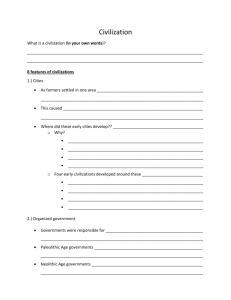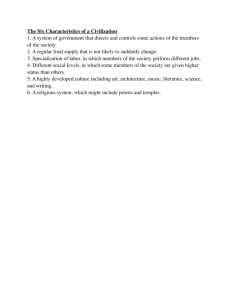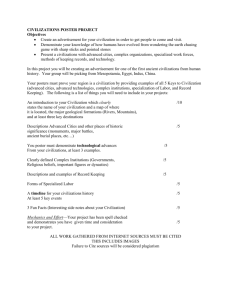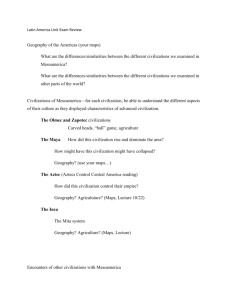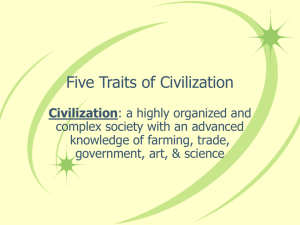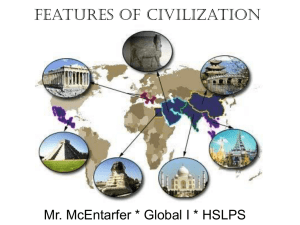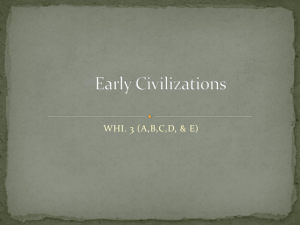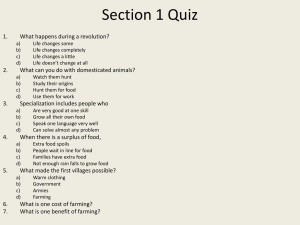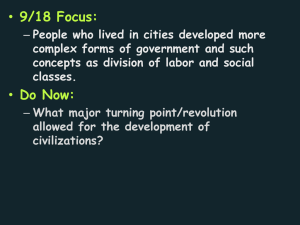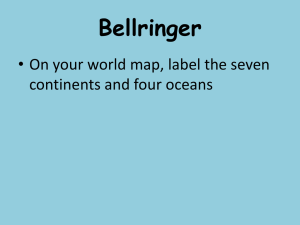Characteristics of Civilizations Presentation
advertisement
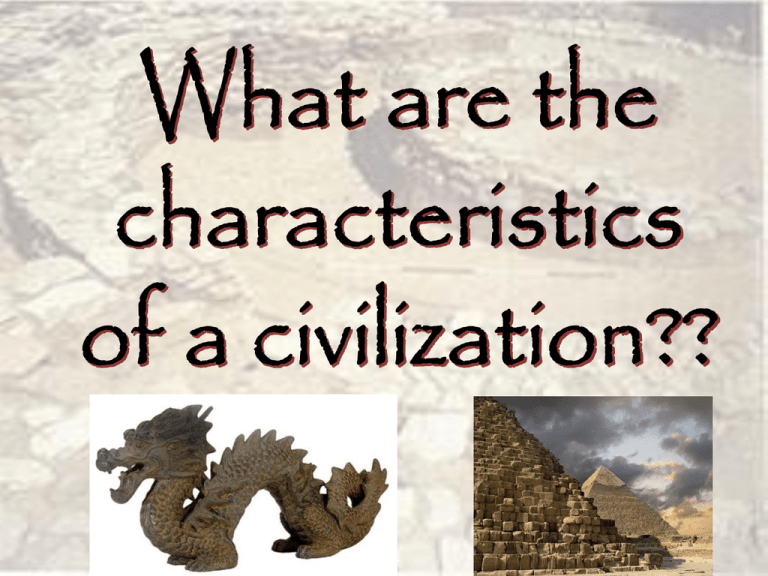
• Cities lead to Civilizations (first one in 3200 BCE SUMER) – Civilization = a complex, highly organized social order First Civilizations • Our first four civilizations surfaced near river valleys b/c conditions favored farming Being located in river valleys had its pros and its cons: PROS: • Flood waters spread nutrient rich silt, favorable for farming • Animals drink & became source of food • Regular water supply & means of transportation Being located in river valleys had its pros and its cons: CONS: • Flooding • Building irrigation channels • Farmers had to work together: built dikes & dug canals CITIES Early cities arose from farming settlements in river valleys • near rivers • Surrounded by high walls – – – Usually for protection had temples and palaces narrow, tangled roads Cities are the central feature of a civilization; without cities, you do not have a civilization! WELL-ORGANIZED CENTRAL GOV’T TO: • Oversee irrigation projects • Ensure a steady food supply was available • Issue laws • Organize defense and military • Collect Taxes COMPLEX RELIGION-POLYTHEISTIC • Gods controlled natural forces & human activities • To ensure good favor with the Gods built temples and offered sacrifices • Full-time priests JOB SPECIALIZATION • Increase in population (time) and increase in tasks leads people to specialize in certain jobs – artisans BRONZE – metalworkers AGE – bricklayers (built city walls) – soldiers = defend city – merchants = sold goods in marketplace • ***Specialization made people dependent on others for various needs*** SOCIAL CLASSES People ranked according to job • Priests/nobles • Wealthy merchants (small group) • Artisans • Peasants/farmers (majority) • Slaves ART AND ARCHITECTURE • Express beliefs and values • Temples and palaces • reassures people of power and strength of the leaders • Built by skilled workers • • • • PUBLIC WORKS— ORDERED BY RULERS irrigations systems roads, bridges defensive walls costly but supposed to benefit city • also used to keep people busy during periods of agricultural inactivity or warring THE INVENTION OF WRITING • Originated with the records of religious offering • At first, used pictograms then abstract ideas (love) then sounds then medical texts! • scribes (specially trained) and educated to read and write • Doesn’t include women Spread of Civilization • What led to the rise of city-states and empires? Interactions Among People • Cultural Diffusion = the spread of ideas, customs, & technologies from one people to another – Perspective – important concept in the understanding of civilizations/cultures • Cultural diffusion occurs through: • migration (due to famine, drought, or other disasters) • trade • warfare ANCIENT MESOPOTAMIA • Oldest known civilization • Cradle of Human Civilization • Old Testament • Nebuchadnezzar • Ziggurat (right) • Hanging gardens ANCIENT EGYPT • • • • • • Nile River Mummies Pharaohs Rameses King Tutankhamen Hieroglyphics Indus River Valley • This civ is still mysterious. • The writing has not been translated. • Walled Cities • mostly farmers. • Traditional economy • They did trade with Chinese and with Sumerians ANCIENT CHINA • Great Wall • Began 2000 B.C. • Mandate of Heaven • Dynasties • Silk • astronomy
